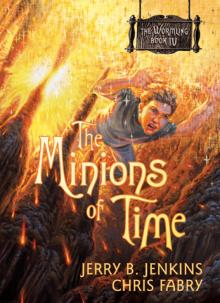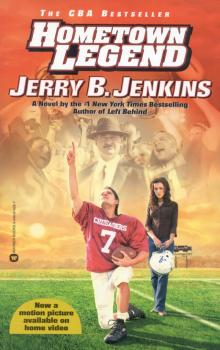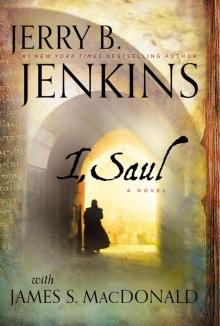- Home
- Jerry B. Jenkins
Riven Page 13
Riven Read online
Page 13
18
Forest View High School
Brady sat in English late in the morning, knowing he should speak to Mrs. Stevens at the end of class and also knowing he wouldn’t. Diagramming sentences and parts of speech would make up more than half the next exam, the diminutive lady told the class, “so don’t say you didn’t know. You have ample time to master this material.”
Maybe if I had a clue. Brady hadn’t been so lost since studying all the organizations within the United Nations in Current History the year before. What was current about something founded so many decades ago?
No amount of help from Mrs. Stevens, and certainly no snot-nosed student tutor, could give Brady a handle on this stuff. And for the life of him, he couldn’t imagine when he would ever need to know any of it. Sure, the UN stuff, if he were to become president of the United States, but even then, would he need to know so much English?
On his way out of class, Mrs. Stevens called out, “Going to be prepared, Mr. Conrad Birdie?”
“You bet,” he said.
“I hope so, son,” she said. “I’m looking forward to seeing your performance.”
That was the most she had ever said to him, and he found himself wondering if she meant in the musical or on the exam.
Brady found a note from the office taped to his locker. “Call Alejandro.”
Terrific.
Adamsville State Penitentiary
Thomas Carey felt the furtive stares from the staff as Russ led him through the maze of glassed-in offices and cubicles, finally to the short corridor that housed the warden, his aides, clerical staff, and a tiny, windowless corner office stuffed with institutional gray metal furniture.
“Gotta go out in the hall to change your mind,” Russ said. “It’s not mahogany row, but it’s empty. I’ve cleared out. You get the job, you get the digs. Guy from NCIC isn’t here yet, but lemme see if I can introduce you to Yanno.”
At the other end of the hall, Russ chatted with Warden Frank LeRoy’s secretary, a short, stocky black woman he introduced as Gladys, wearing a loud purple muumuu. She knocked softly on the warden’s door and ushered Russ and Thomas in.
LeRoy, a big man in ill-fitting clothes—shirt too tight around the belly, trousers too short—was hanging up the phone. His office was bigger than the others and painted nicely, but the furniture was as modest as the chaplain’s. Plaques and pictures hung everywhere, and the desk was messy.
“So, you’re gonna be the new chaplain?” LeRoy said as he shook Thomas’s hand.
“Well, I hope so, sir.”
“Got to do the NCIC thing first, you know,” Russ said.
“Oh, so you’re just starting the process. Once they waive all the restrictions over your sordid past, we’ll welcome you to the team.”
Thomas was puzzled until Russ burst out laughing. “The warden says that to all newbies. I think he’s aware you’re a man of the cloth without a criminal record.”
Thomas smiled.
“Well,” LeRoy said, “we all have records. Some just served more semesters than others. Ever served time, Carey?”
“Oh no.”
“Russ has. Did he tell ya?”
“No,” Thomas said, sure this was another joke.
“Seriously,” LeRoy said. “A little county time, wasn’t it, Russ? NCIC cleared him, though. Probably wouldn’t happen today.”
“Long time ago,” Russ said. “Listen, Frank, I was wondering. You know that little office down there hasn’t seen a coat of paint in years. I’ve got everything off the walls and out of the desk and cabinets. Might be a good time to spruce it up, you know, before Thomas moves in.”
“Yeah, no,” LeRoy said, and it was all Thomas could do to keep a straight face. “I mean, if you get the job, Carey, and you want to do a little spackling and throw a can of paint on the wall, feel free. But with budgets and all, that’s on you. Proud as this state is of its prisons, money will always be an issue.”
Gladys poked her head in. “NCIC is here for Reverend Carey, waiting in the chaplain’s office.”
The “guy” from the National Compliance Integrity Commission turned out to be June Byrne, a tall, handsome woman in her midfifties with red hair and freckles. She wore large pieces of jewelry and carried a bulging soft leather satchel. From it she produced a three-inch-thick sheaf of computer printouts and set them on the desk in front of her.
After shaking Thomas’s hand and introducing herself as a former police chief, she said, “If this turns out to be your office soon, thanks for letting me use it.” As they sat, she said, “What makes a man want to become a prison chaplain?”
Thomas briefly told her of his faith, his education, and his pastorates. He was more nervous than he expected and found himself wishing he had some water. “I just care about people and their souls and hope I can offer something to the men here.”
“Uh-huh. Well, you realize I’m not interviewing you for the position. My job is to assure the state Department of Corrections and the federal government that you comply with all requirements for personal and professional integrity. Ever been convicted of a crime?”
“No.”
“Ever been arrested?”
“No.”
“Should you have been?”
“Pardon?”
“Ever done anything that should have got you arrested, but you got away with it?”
Thomas chuckled. “No.”
“Cheat on a test, steal from your mother’s purse, shoplift a piece of candy from the store?”
“Believe it or not, no.”
“I don’t believe it, but I can’t prove it, and such are not worthy of a polygraph, so I’ll have to take you at your word.”
Thomas wondered why he felt guilty. He really wanted this woman to believe him. “I lied to my mother once,” he said. “Told her something was mine when it actually belonged to my brother.”
She looked amused. “You devil you. So what happened?”
“Conscience got the better of me and I wound up confessing.”
“Get punished?”
“Oh yeah. Big-time spanking.”
“You don’t say. That’s the way I was raised too. How old were you, Thomas?”
“Eight.”
Ms. Byrne erupted in laughter. “Better put that in your file, hadn’t I? FBI may want to look into it.”
“I just wanted you to know I’m not perfect, but I really haven’t ever done any of those other things you suggested.”
June Byrne was suddenly all business, flipping through her printouts, brow furrowed. “You once got a refund from the Bible college you attended, but it was twice what you were owed.”
“That’s right. You people are certainly thorough. I noticed they had overcharged me for some extracurricular stuff I never took advantage of, so I was owed something like a hundred and fifty dollars.”
“One hundred sixty-eight dollars and seventy-three cents.”
“Right, okay.”
“It was a choir bus tour that you never went on.”
“Right. I had paid for it but then couldn’t go.”
“But they reimbursed you twice.”
“Yes, they did. And of course I returned the extra.”
“How long did that take?”
“Well, let’s see; it’s been years. Seems to me it came on a Thursday, I had to work the next day, then came the weekend, then I mailed it Monday, so they got it probably the next Wednesday.”
“You held it almost a week?”
“Not really. I mean, I didn’t deposit it or anything. I returned the same check they sent me. The school never mentioned a problem.”
“It’s not a problem, Reverend Carey. It’s just a question, and interesting. Unlikely to become an issue. And then there’s the matter of four speeding tickets in the last twenty years, one citation for excessive lane changing, and one for double-parking. You’re aware that last is a federal offense?”
“Excuse me?”
Ms. Byrne gr
inned. “A little NCIC humor, Reverend. Lighten up.”
“Oh! Sorry.”
“Your credit reports look clean—a little heavy on credit card debt, not unusual for those in your line of work. Late on one card payment, late on your mortgage twice, but—”
“Oh, I’m sorry, but that’s incorrect, ma’am.”
“I’m listening.”
“Grace and I have never owned a home, never had a mortgage. And to my knowledge, we’ve never been late on a rent check either.”
“The mortgage part was a test, Reverend Carey. Making sure you’re paying attention.”
“Believe me, I am.”
“Is it not true that you are currently overdue on your rent for the parsonage to the Rural Bible Chapel in Oldenburg?”
“Oh, for the love of all things sacred! If you have the time, I’ll gladly tell you that story, and trust me, I won’t leave out one detail.”
“Do tell.”
Forest View High School
Brady’s mind raced as he dialed Dennis Asphalt & Paving. Of course he knew what this was about. It amazed him that in seconds he could concoct more than one elaborate tale, never even considering just gushing the truth and begging Alejandro’s forgiveness.
As soon as Alejandro came on the line, he said, “Hey, Brady, sorry to bother you at school, but I got a problem.”
“A problem?”
“I think you know, son.”
“No, sir. No idea.”
After a long pause, Alejandro said, “You think I’m blind? There’s a stop missing, but we both know where it is, don’t we?”
“I don’t. I mean, I saw one was missing, but I don’t know who took it.”
“Listen, Brady, I told you there’d be a learning curve, didn’t I? You didn’t have to try to hide the damage.”
“I didn’t. I swear.”
“Uh-huh. How’d it get down the ravine, then? You think you’re the first to think of that? We take inventory, you know.”
“Yeah, I know.”
Alejandro chuckled, and for the first time, Brady thought he might skate. “That’s where all the broken ones go eventually, man. Why try to hide it? C’mon, Brady. I gotta be able to trust you. I’m not gonna take it out of your pay, but just tell me next time, okay?”
“Well, it wasn’t me, so . . .”
“Fine, but you’re responsible.”
Brady spent the rest of the day berating himself. Why did he bring this stuff on himself? And how hard could this homework be? If he just tried, his teachers would notice. But it was too late. There was no way he’d be ready for the exams, regardless. He would have to be so good at rehearsal that afternoon that everyone would see he was irreplaceable.
19
Ten Days Later | Adamsville
Thomas Carey’s best suit had been out of fashion for a decade, but Grace had matched the navy with a light blue shirt and medium blue tie. As he pulled up to the guardhouse at the state penitentiary, Thomas felt he looked as professional as he was able. He had splurged on new socks, and he always kept his oxfords spit shined. His big Bible was on the seat, and despite his discomfort at entering the facility alone for the first time—and wishing Chaplain Russ wasn’t already a full-time retiree hundreds of miles to the south—Thomas could barely contain his excitement.
The job was his. June Byrne had been amused, then enraged, by his account of the travesty in Oldenburg. He had passed her scrutiny without a hitch. In a few minutes he would be welcomed by the warden and his staff with a coffee and pastry break; then the warden himself would debrief him and lead him on a tour.
“Let me just study your face and your car for a second,” the officer at the guardhouse said, double-checking Thomas’s documents. “We’re careful, but we like to make this as quick and easy as we can on our full-timers. Every day I’ll peek in your backseat, and I’ll watch your eyes in case you need to tell me anything—like if someone’s stowed away in your trunk—but otherwise, like I say, we won’t detain you.”
“Pardon me,” Thomas said. “That sounds great. But if someone forced me to bring him here in my trunk, couldn’t I just—?”
“Leave him in there? Sure. But what if he had an accomplice at your house and was holding a loved one hostage who might be imperiled if you didn’t get the bad guy inside here?”
“I see.”
“It’s rare, Reverend. But we try not to miss a thing. Welcome aboard.”
Forest View High School
Mr. Nabertowitz had broken his own long-standing rule and begun to allow spectators at the daily rehearsals, and the Little Theater was usually at least half full. “Normally I worry that letting people in early will spoil sales,” he said. “But we’re already sold out for all six performances, and I want all the buzz I can get.”
News of the first dress rehearsal had traveled farther and wider than anyone expected, and the place was jammed. Parents came. Friends came. Even the local press showed up.
If Brady thought he’d gotten a taste of popularity by simply landing the Conrad Birdie role, he was soon to know what it was like to be a bona fide center of attention. The cast looked great, Brady shone in his gold lamé suit, and while the staging and timing were understandably still in process, it was quickly becoming clear that this show was going to be something special.
The highlight of the afternoon for Brady had been standing next to Mr. Nabertowitz when the father character was singing his big number about what was the matter with kids these days. The actor could barely carry a tune, and when he went for the high dramatic notes, he failed miserably and disgustedly shook his head.
Mr. N. had warned the cast that he would not hold back during dress rehearsal, even when outsiders were there. “You screw up, I’m going to tell you, so be prepared.”
Not unkindly, he urgently told the boy, “You have got to get this. This is a showstopping song. You’re getting better on most of it, but you need to find those notes and nail them. Otherwise the show is stopped for the wrong reason.”
They ran through the scene a couple more times, and the actor got no closer. Finally Brady asked if he could talk to Mr. Nabertowitz privately.
“Make it quick.”
“I have an idea, if you want to hear it.”
“I’m desperate, son.”
“He’s not going to hit those notes. That’s not something you can learn. The problem is when he breaks character and acts disgusted with himself. Tell him to play it straight and belt it out at the top of his lungs, like he’s proud of himself for hitting the notes he’s missing. People love a buffoon.”
Nabertowitz studied Brady. “You might be on to something. He’s perfect in the speaking parts, and he knows all the lyrics. But we’re going to bog down waiting for him to do something he seems incapable of.”
The director called the boy over and briefed him. The actor looked dubious but said he’d give it a try. “Kids!” Nabertowitz shouted. “From the top!”
This time, when the actor got to the difficult parts, he spread his feet, squared his shoulders, planted his fists at his waist, threw his head back, and belted it out for all he was worth. He missed the notes by a mile but sang with a sneer of confidence, as if performing an aria at the Met. The audience erupted in cheers and laughter, and Forest View’s Bye Bye Birdie had its singular moment.
Brady’s performance was stellar. He hit every line and note and step with just enough charm and swagger and danger for the role, and Mr. N. crowed to everyone that he was also like an assistant director. He let it be known to all that the idea that made the father’s performance work was Brady’s alone.
All the success served to make Brady Darby the most popular, talked-about, sought-after kid in the school. He even had attention from girls—real women, cheerleader types—like he had rarely experienced before. He wasn’t stupid. He knew the type. They loved the attention of getting next to the bad boy. They weren’t really going to date him or fall for him, and while he daydreamed about several of them,
no preppy girl and he were going to become an item.
But this was sure fun.
As opening night approached, so did midterm exams. Brady hoped everyone in authority—though he had been warned otherwise—was prepared to make an exception in his case. Because while he was as ready for opening night as he had been for anything else in his life, he was not ready for midterms.
Adamsville State Penitentiary
Thomas had never worked for the state before, and he was pleasantly surprised to find how nice bureaucrats were to newcomers. He was treated the same at the main gate as he had been at the guardhouse, with two officers assuring him they would recognize him from now on and telling him they hoped he’d work out the way Chaplain Russ had and stay at least as long.
That was Thomas’s dream too. He couldn’t help himself. He was an optimist. He had seen every new church and ministry opportunity as something unique from God, and while each in its own way had gone south on him over the years, nothing had ever fully taken the wind from his sails. He was committed. He would remain true. He would stay in the Word, as he and people like him were wont to say about studying the Bible every day. He would rise at dawn and kneel and pray and read and memorize. He and Grace would sing together other each evening. And he would look for opportunities to introduce people to Jesus. Adamsville State Penitentiary sure seemed the ideal place for that.
He had to admit that there were parts of ministry he wasn’t that good at. The preaching thing, for one. Oh, he had tried, had given it all he had. He had seen and heard the best of the best at Bible college and at the occasional conference over the years. He’d been inspired and taken notes and even tried copying the techniques and mannerisms of the most engaging preachers. But he knew he had never riveted a crowd, never persuaded anyone just from the strength of his own passion and delivery.
He was better at the one-on-one: teaching, discipling, encouraging. That was why this new role seemed a perfect fit. Thomas had taken Russ’s misgivings to heart and knew he would have to be wise as a serpent and gentle as a dove, as the Scripture said. That would all come in time. For now, he had a lot to learn.

 The Betrayal
The Betrayal The Valley of Dry Bones
The Valley of Dry Bones The Minions of Time
The Minions of Time Wild Rescue
Wild Rescue Though None Go with Me
Though None Go with Me Hometown Legend
Hometown Legend The Breakthrough
The Breakthrough The Youngest Hero
The Youngest Hero Nicolae High
Nicolae High Through the Flames
Through the Flames The Brotherhood
The Brotherhood Grave Shadows
Grave Shadows The Changeling
The Changeling Shadowed
Shadowed Precinct 11 - 01 - The Brotherhood
Precinct 11 - 01 - The Brotherhood Second Chance
Second Chance Silenced
Silenced The Vanishings
The Vanishings Dead Sea Rising
Dead Sea Rising Soon
Soon The Author's Blood
The Author's Blood The Sword of the Wormling
The Sword of the Wormling Left Behind - The Kids 02 - Second Chance
Left Behind - The Kids 02 - Second Chance Haunted Waters
Haunted Waters The Underground
The Underground Mark's Story
Mark's Story Shaken
Shaken Deceived
Deceived Frantic
Frantic Riven
Riven Facing the Future
Facing the Future Stung
Stung I, Saul
I, Saul Hunted
Hunted Arrived
Arrived John's Story
John's Story Stolen Secrets
Stolen Secrets